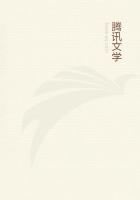Forthwith he bade his men fetch him a comb of gold and a scissors with loops of silver, and he combed the hair of Kilweh his guest.
'Tell me who thou art,' he said, 'for my heart warms to thee, and I feel thou art come of my blood.'
'I am Kilweh, son of Kilydd,' replied the youth.
'Then my cousin thou art in truth,' replied Arthur, 'and whatsoever boon thou mayest ask thou shalt receive.'
'The boon I crave is that thou mayest win for me Olwen, the daughter of Yspaddaden Penkawr, and this boon I seek likewise at the hands of thy warriors. From Sol, who can stand all day upon one foot; from Ossol, who, if he were to find himself on the top of the highest mountain in the world, could make it into a level plain in the beat of a bird's wing; from Cluse, who, though he were buried under the earth, could yet hear the ant leave her nest fifty miles away: from these and from Kai and from Bedwyr and from all thy mighty men I crave this boon.'
'O Kilweh,' said Arthur, 'never have I heard of the maiden of whom thou speakest, nor of her kindred, but I will send messengers to seek her if thou wilt give me time.'
'From this night to the end of the year right willingly will Igrant thee,' replied Kilweh; but when the end of the year came and the messengers returned Kilweh was wroth, and spoke rough words to Arthur.
It was Kai, the boldest of the warriors and the swiftest of foot-- he would could pass nine nights without sleep, and nine days beneath the water--that answered him:
'Rash youth that thou art, darest thou speak thus to Arthur? Come with us, and we will not part company till we have won that maiden, or till thou confess that there is none such in the world.'
Then Arthur summoned his five best men and bade them go with Kilweh. There was Bedwyr the one-handed, Kai's comrade and brother in arms, the swiftest man in Britain save Arthur; there was Kynddelig, who knew the paths in a land where he had never been as surely as he did those of his own country; there was Gwrhyr, that could speak all tongues; and Gwalchmai the son of Gwyar, who never returned till he had gained what he sought; and last of all there was Menw, who could weave a spell over them so that none might see them, while they could see everyone.
So these seven journeyed together till they reached a vast open plain in which was a fair castle. But though it seemed so close it was not until the evening of the third day that they really drew near to it, and in front of it a flock of sheep was spread, so many in number that there seemed no end to them. A shepherd stood on a mound watching over them, and by his side was a dog, as large as a horse nine winters old.
'Whose is this castle, O herdsmen?' asked the knights.
'Stupid are ye truly,' answered the herdsman. 'All the world knows that this is the castle of Yspaddaden Penkawr.'
'And who art thou?'
'I am called Custennin, brother of Yspaddaden, and ill has he treated me. And who are you, and what do you here?'
'We come from Arthur the king, to seek Olwen the daughter of Yspaddaden,' but at this news the shepherd gave a cry:
'O men, be warned and turn back while there is yet time. Others have gone on that quest, but none have escaped to tell the tale,' and he rose to his feet as if to leave them. Then Kilweh held out to him a ring of gold, and he tried to put it on his finger, but it was too small, so he placed it in his glove, and went home and gave it to his wife.
'Whence came this ring?' asked she, 'for such good luck is not wont to befall thee.'
'The man to whom this ring belonged thou shalt see here in the evening,' answered the shepherd; 'he is Kilweh, son of Kilydd, cousin to king Arthur, and he has come to seek Olwen.' And when the wife heard that she knew that Kilweh was her nephew, and her heart yearned after him, half with joy at the thought of seeing him, and half with sorrow for the doom she feared.
Soon they heard steps approaching, and Kai and the rest entered into the house and ate and drank. After that the woman opened a chest, and out of it came a youth with curling yellow hair.
'It is a pity to hid him thus,' said Gwrhyr, 'for well I know that he has done no evil.'
'Three and twenty of my sons has Yspaddaden slain, and I have no more hope of saving this one,' replied she, and Kai was full of sorrow and answered:
'Let him come with me and be my comrade, and he shall never be slain unless I am slain also.' And so it was agreed.
'What is your errand here?' asked the woman.
'We seek Olwen the maiden for this youth,' answered Kai; 'does she ever come hither so that she may be seen?'
'She comes every Saturday to wash her hair, and in the vessel where she washes she leaves all her rings, and never does she so much as send a messenger to fetch them.'
'Will she come if she is bidden?' asked Kai, pondering.
'She will come; but unless you pledge me your faith that you will not harm her I will not fetch her.'
'We pledge it,' said they, and the maiden came.
A fair sight was she in a robe of flame-coloured silk, with a collar of ruddy gold about her neck, bright with emeralds and rubies. More yellow was her head than the flower of the broom, and her skin was whiter than the foam of the wave, and fairer were her hands than the blossoms of the wood anemone. Four white trefoils sprang up where she trod, and therefore was she called Olwen.
She entered, and sat down on a bench beside Kilweh, and he spake to her:
'Ah, maiden, since first I heard thy name I have loved thee--wilt thou not come away with me from this evil place?'
'That I cannot do,' answered she, 'for I have given my word to my father not to go without his knowledge, for his life will only last till I am betrothed. Whatever is, must be, but this counsel I will give you. Go, and ask me of my father, and whatsoever he shall required of thee grant it, and thou shalt win me; but if thou deny him anything thou wilt not obtain me, and it will be well for thee if thou escape with thy life.'
'All this I promise,' said he.
So she returned to the castle, and all Arthur's men went after her, and entered the hall.
'Greeting to thee, Yspaddaden Penkawr,' said they. 'We come to ask thy daughter Olwen for Kilweh, son of Kilydd.'















